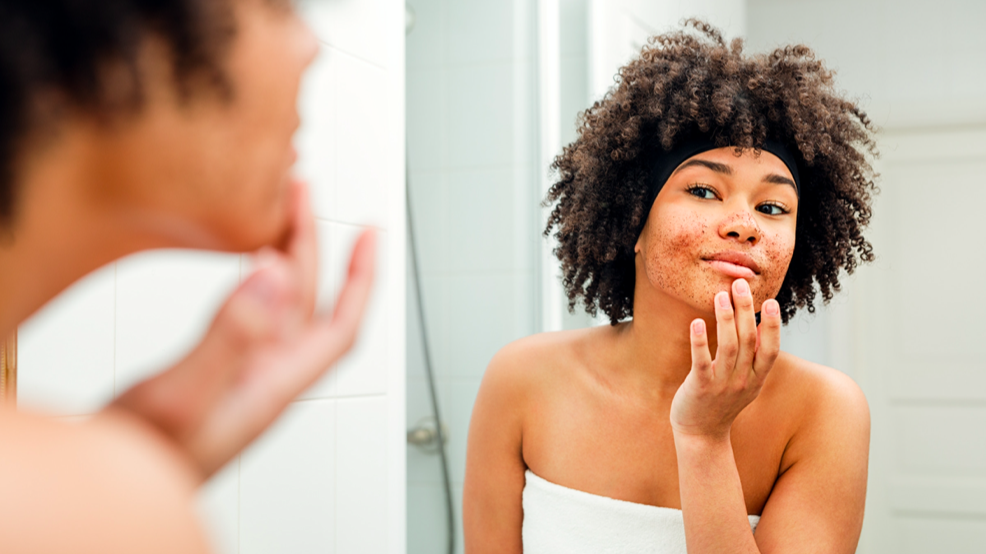Dry Skin In Pregnancy & How To Treat It
Do you know your skin type? Even if you don't have dry skin (typically), we encourage you to keep reading because your skin type can change as you age–and it can also (and usually does) change when become pregnant and then during the postpartum period. On Instagram, we asked you how your skin changed during pregnancy, and a whopping 65% of you said that your skin became more dry.
So we know this is something that many of you deal with–and what's more, you may not have a dry skin type, but instead have dehydrated skin. But how can you tell the difference? We're going to break it down for you.
Let's start with the markers of a dry skin type:
Tight feeling skin, especially after showering
Flaky, dull appearance overall
Visible wrinkles
Easily irritated skin
Reduced elasticity or "bounce" to the skin
So why am I getting dry skin?
Dry skin is caused by a lack of natural moisture. Effectively, your body isn’t producing enough oil to keep the skin hydrated and protected, and that's where your skincare routine can help out.
Although we usually associate acne with oily skin, having dry skin definitely doesn't make you immune to breakouts–actually, it's quite the opposite! Because your natural oil barrier isn't fully doing its job, your skin can be even more easily irritated, and toxins can have an easier job of getting under the skin, leading to breakouts.
To make matters worse, if you're trying to combat acne with drying products and lightweight moisturizers, your skin may then start overproducing oil to compensate–only clogging your pores further. It's a vicious cycle.
Dehydrated skin is a skin condition–and it can affect anyone, even if you have a typically oily skin type. Here's how to tell if your skin is dehydrated:
Complexion is flaky and patchy, but oily in T-zone
Skin absorbs products easily
Dull appearance & dark circles
Itchiness
If you feel like your skin soaks up anything you put on it, you might have dehydrated skin. Unfortunately, the solution isn't always just to drink more water. Being dehydrated can make your skin dehydrated, but dehydrated skin isn’t always caused by dehydration...we know, it’s confusing. But once you figure out the source of your dry or dehydrated skin, you can get your complexion feeling soft and hydrated again!
Here are some reasons why your skin may be feeling parched:
Stress
Medication/hormonal contraception
Air conditioning
Central heating
Wind/dry air
Too much sun
Excess alcohol
Excess caffeine
Genetics
Pregnancy!
Is not drinking enough water the culprit?
Not always! You can be chugging a gallon a day and still feeling dry. Take a day and track your water to see how much you’re actually drinking just to be sure–you may feel like you’re drinking more water than you are (and remember, diuretics like coffee and tea cancel out their weight in water).
Do I need to eat more fruit? Veggies? Fat? Protein? Anything?
Maybe, but don’t automatically blame your diet. Make sure you’re getting enough healthy fat--especially omega-3s, which are found in foods like fatty fish and flaxseeds. However, there’s no quick-fix or magic diet for supple skin. Make sure you’re eating a balanced diet, minimal processed food and sodium, and include plenty of colors. Fruits and veg are full of vitamins and micronutrients you can’t get anywhere else, and they’ll help your body from the inside out.
Here's how to hydrate your skin the right way:
Avoid anything harsh and stripping. We know, we know...foaming cleansers are sooo satisfying, but they can also be harsher than your skin needs. Use a gentle, unscented, soap-free cleanser or cleansing milk instead.
Add hydrating serums and functional products that contain ingredients like hyaluronic acid – they deliver moisture directly to your cells. Start slow and see how your skin reacts, and go from there. (TIP: this should be the step between your cleanser and moisturizer).
Use a good moisturizer! Avoid anything labeled oil-free, lightweight, anti-acne, or mattifying. Look for gentle, unscented creams that come in a pot. Don't be afraid of oil: it may be just what your parched complexion is thirsty for.
Want more stage-specific guidance? Try the Baby2Body app today for guided breathing exercises, meditations, and wellness tips — always suited to you.

